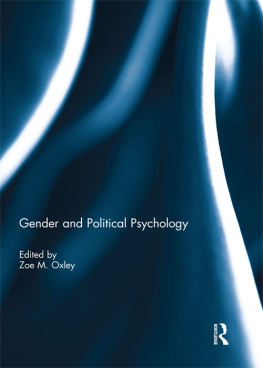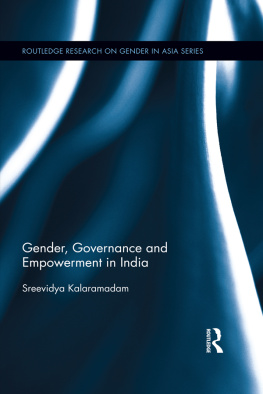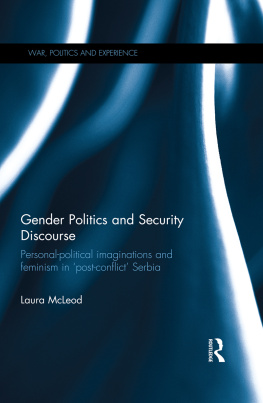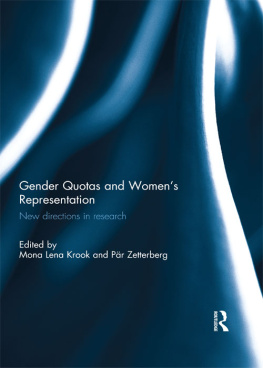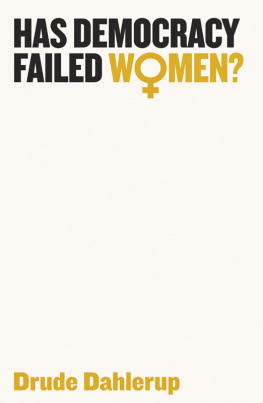Gender and Political Psychology
This book showcases new work done by gender politics scholars and political psychologists, covering a variety of political psychology topics. These include stereotyping and prejudice, intergroup conflict, social identity, attitude formation, group affinity, group decision-making, anxiety, contextual effects on individual behaviour, and the evolutionary roots of political behaviour. Political psychological insights are applied to address topics of longstanding concern within the field of gender and politics.
Among the citizenry, gender differences in political ideology, responses to partisan conflict, Hispanic identity formation, and symbolic racism are explored. Other chapters pose the following questions relating to female candidates: What have been the effects of state parties gender-inclusive policies? Who is most likely to gender stereotype candidates? Are general attitudes toward women in political office related to vote choice in specific contests? What are the implications of politicized motherhood? Finally, a set of essays engage a variety of themes related to gender, decision-making rules, and authority in small deliberative bodies.
This book was originally published as a special issue of Politics, Groups, and Identities.
Zoe M. Oxley is Professor of Political Science at Union College, Schenectady, NY, USA. Her research interests include women in electoral politics, gender and public opinion, gender stereotyping, and the effects of the media on public opinion. She is the co-author of Public Opinion: Democratic Ideals, Democratic Practice (2016).
First published 2016
by Routledge
2 Park Square, Milton Park, Abingdon, Oxon, OX14 4RN, UK
and by Routledge
711 Third Avenue, New York, NY 10017, USA
Routledge is an imprint of the Taylor & Francis Group, an informa business
2016 Western Political Science Association
All rights reserved. No part of this book may be reprinted or reproduced or utilised in any form or by any electronic, mechanical, or other means, now known or hereafter invented, including photocopying and recording, or in any information storage or retrieval system, without permission in writing from the publishers.
Trademark notice: Product or corporate names may be trademarks or registered trademarks, and are used only for identification and explanation without intent to infringe.
British Library Cataloguing in Publication Data
A catalogue record for this book is available from the British Library
ISBN 13: 978-1-138-96103-6
Typeset in Times New Roman
by RefineCatch Limited, Bungay, Suffolk
Publishers Note
The publisher accepts responsibility for any inconsistencies that may have arisen during the conversion of this book from journal articles to book chapters, namely the possible inclusion of journal terminology.
Disclaimer
Every effort has been made to contact copyright holders for their permission to reprint material in this book. The publishers would be grateful to hear from any copyright holder who is not here acknowledged and will undertake to rectify any errors or omissions in future editions of this book.
The chapters in this book were originally published in Politics, Groups, and Identities, volume 3, issue 1 (March 2015). When citing this material, please use the original page numbering for each article, as follows:
Introduction
Gender and political psychology
Zoe M. Oxley
Politics, Groups, and Identities, volume 3, issue 1 (March 2015) pp. 13
Chapter 1
Same blueprint, different bricks: reexamining the sources of the gender gap in political ideology
Meghan Condon and Amber Wichowsky
Politics, Groups, and Identities, volume 3, issue 1 (March 2015) pp. 420
Chapter 2
Why partisan warriors dont listen: the gendered dynamics of intergroup anxiety and partisan conflict
Patrick R. Miller and Pamela Johnston Conover
Politics, Groups, and Identities, volume 3, issue 1 (March 2015) pp. 2139
Chapter 3
Americana or Latina? Gender and identity acquisition among Hispanics in the United States
Heather Silber Mohamed
Politics, Groups, and Identities, volume 3, issue 1 (March 2015) pp. 4058
Chapter 4
Untangling the gender gap in symbolic racist attitudes among white Americans
Angie Maxwell
Politics, Groups, and Identities, volume 3, issue 1 (March 2015) pp. 5972
Chapter 5
The unintended effects of political party affirmative action policies on female candidates nomination chances
Angela L. Bos
Politics, Groups, and Identities, volume 3, issue 1 (March 2015) pp. 7393
Chapter 6
Who stereotypes female candidates? Identifying individual differences in feminine stereotype reliance
Nichole M. Bauer
Politics, Groups, and Identities, volume 3, issue 1 (March 2015) pp. 94110
Chapter 7
Making the connection? Attitudes about women in politics and voting for women candidates
Kathleen Dolan and Timothy Lynch
Politics, Groups, and Identities, volume 3, issue 1 (March 2015) pp. 111132
Chapter 8
Mothers on the campaign trail: implications of Politicized Motherhood for women in politics
Grace Deason, Jill S. Greenlee and Carrie A. Langner
Politics, Groups, and Identities, volume 3, issue 1 (March 2015) pp. 133148
Chapter 9
Why womens numbers elevate womens influence, and when they do not: rules, norms, and authority in political discussion
Christopher F. Karpowitz, Tali Mendelberg and Lauren Mattioli
Politics, Groups, and Identities, volume 3, issue 1 (March 2015) pp. 149177
Chapter 10
Womens agency and voice: a commentary on Karpowitz, Mendelberg, and Mattioli
Leonie Huddy
Politics, Groups, and Identities, volume 3, issue 1 (March 2015) pp. 178183
Chapter 11
Empowerment versus backlash: gender quotas and critical mass theory
Mona Lena Krook
Politics, Groups, and Identities, volume 3, issue 1 (March 2015) pp. 184188
Chapter 12
Gendered politics: political psychology at the intersection of the individual and the environment
Nicholas J.G. Winter
Politics, Groups, and Identities, volume 3, issue 1 (March 2015) pp. 189194
Chapter 13
Numbers, rules, norms, and authority but where are the people? Some thoughts on Karpowitz, Mendelberg, and Mattioli

